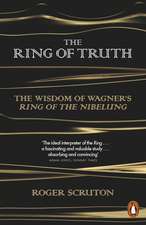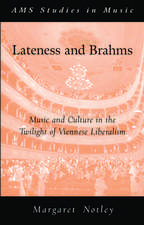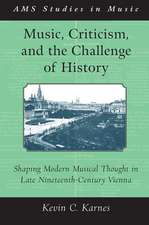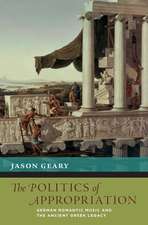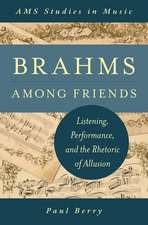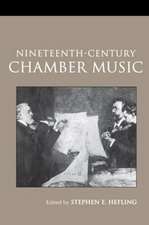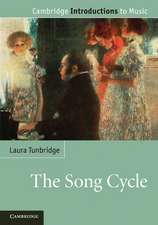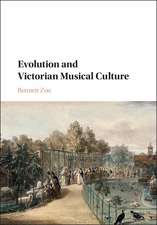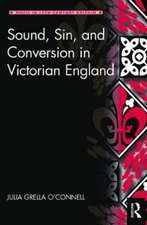Michael Costa: England's First Conductor: The Revolution in Musical Performance in England, 1830-1880: Music in Nineteenth-Century Britain
Autor John Gouldenen Limba Engleză Hardback – 18 mar 2016
| Toate formatele și edițiile | Preț | Express |
|---|---|---|
| Paperback (1) | 436.14 lei 6-8 săpt. | |
| Taylor & Francis – 12 dec 2019 | 436.14 lei 6-8 săpt. | |
| Hardback (1) | 1114.70 lei 6-8 săpt. | |
| Taylor & Francis – 18 mar 2016 | 1114.70 lei 6-8 săpt. |
Din seria Music in Nineteenth-Century Britain
-
 Preț: 178.05 lei
Preț: 178.05 lei - 9%
 Preț: 934.96 lei
Preț: 934.96 lei -
 Preț: 330.20 lei
Preț: 330.20 lei -
 Preț: 469.34 lei
Preț: 469.34 lei -
 Preț: 489.26 lei
Preț: 489.26 lei - 18%
 Preț: 1057.89 lei
Preț: 1057.89 lei - 18%
 Preț: 1002.63 lei
Preț: 1002.63 lei -
 Preț: 469.34 lei
Preț: 469.34 lei -
 Preț: 469.34 lei
Preț: 469.34 lei -
 Preț: 469.34 lei
Preț: 469.34 lei -
 Preț: 469.34 lei
Preț: 469.34 lei - 18%
 Preț: 1005.80 lei
Preț: 1005.80 lei -
 Preț: 469.34 lei
Preț: 469.34 lei - 13%
 Preț: 338.33 lei
Preț: 338.33 lei - 31%
 Preț: 764.62 lei
Preț: 764.62 lei -
 Preț: 469.34 lei
Preț: 469.34 lei -
 Preț: 436.14 lei
Preț: 436.14 lei - 25%
 Preț: 823.99 lei
Preț: 823.99 lei - 18%
 Preț: 1061.06 lei
Preț: 1061.06 lei -
 Preț: 489.26 lei
Preț: 489.26 lei - 18%
 Preț: 1063.73 lei
Preț: 1063.73 lei - 26%
 Preț: 850.99 lei
Preț: 850.99 lei -
 Preț: 469.34 lei
Preț: 469.34 lei -
 Preț: 469.34 lei
Preț: 469.34 lei - 13%
 Preț: 338.33 lei
Preț: 338.33 lei - 13%
 Preț: 338.33 lei
Preț: 338.33 lei - 18%
 Preț: 1015.26 lei
Preț: 1015.26 lei -
 Preț: 469.34 lei
Preț: 469.34 lei - 18%
 Preț: 1058.38 lei
Preț: 1058.38 lei - 30%
 Preț: 769.55 lei
Preț: 769.55 lei - 18%
 Preț: 1062.62 lei
Preț: 1062.62 lei - 18%
 Preț: 1061.06 lei
Preț: 1061.06 lei
Preț: 1114.70 lei
Preț vechi: 1359.39 lei
-18% Nou
Puncte Express: 1672
Preț estimativ în valută:
213.33€ • 221.89$ • 176.11£
213.33€ • 221.89$ • 176.11£
Carte tipărită la comandă
Livrare economică 14-28 aprilie
Preluare comenzi: 021 569.72.76
Specificații
ISBN-13: 9781472427175
ISBN-10: 1472427173
Pagini: 244
Ilustrații: Includes 37 b&w illustrations
Dimensiuni: 156 x 234 x 16 mm
Greutate: 0.61 kg
Ediția:New ed.
Editura: Taylor & Francis
Colecția Routledge
Seria Music in Nineteenth-Century Britain
Locul publicării:Oxford, United Kingdom
ISBN-10: 1472427173
Pagini: 244
Ilustrații: Includes 37 b&w illustrations
Dimensiuni: 156 x 234 x 16 mm
Greutate: 0.61 kg
Ediția:New ed.
Editura: Taylor & Francis
Colecția Routledge
Seria Music in Nineteenth-Century Britain
Locul publicării:Oxford, United Kingdom
Cuprins
Costa's background and personality. Conducting prior to 1830. Costa's system. Costa as a conductor. Opera. Concerts, oratorios and festivals. Costa's reputation and legacy. Reassessment.
Notă biografică
Sir John Goulden retired in 2000 from a distinguished career in the British Diplomatic Service, during which he served as Ambassador to Turkey and Permanent Representative to Nato (1995-2000). On retirement he began to pursue his interest in the revolution in musical performance during the early nineteenth century and the role in this of the conductor and composer Michael Costa. He was awarded a PhD in musicology in 2012.
Recenzii
'This is a learned survey of how the conductor gained importance and control, and uses Costa as an example. It dissects his relationships with concert-giving organisations throughout the country'
- Christopher Morley, Birmingham Post
"This is an important and timely book."
- Christopher Morley, Birmingham Post
"This is an important and timely book."
Descriere
Among the major changes that swept through the music industry during the mid-nineteenth century was how musical performances were managed and directed. From a loose control shared between the violin-leader, musical director and maestro al cembalo to a system of tight and unified control under a professional conductor-manager. This process brought with it not only baton conducting in its modern form, but also higher standards, a new orchestral lay-out and a more focused rehearsal regime. The key figure in this process was Michael Costa whose uniquely powerful position in the operatic, symphonic and choral worlds provide a fascinating insight into the politics and changing aesthetics of the Victorian musical landscape.

